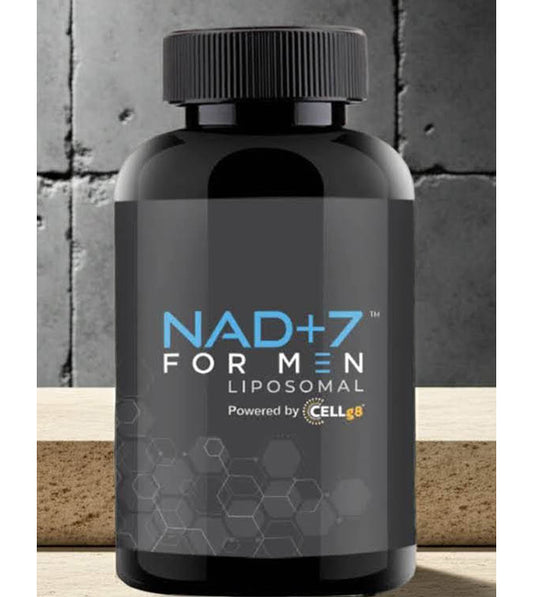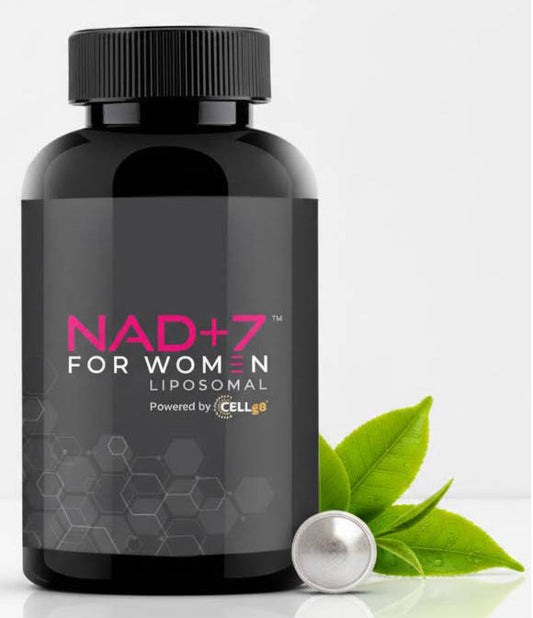A Practical Guide: 4 Ways to Naturally Support Your NAD+ Levels
Share
The Science of NAD+: 5 Evidence-Based Benefits of Effective Supplementation
For decades, scientists have been studying the molecular mechanics of aging. Among the many molecules studied in aging research, Nicotinamide Adenine Dinucleotide (NAD+) stands out. This essential coenzyme naturally decreases as we get older, influencing key cellular processes.[1] This has led to a surge in scientific interest in a key question: can supporting our NAD+ levels through supplementation provide tangible, evidence-based benefits for our health and longevity?
This guide explores the science behind why NAD+ is so critical and the evidence-supported benefits of using a high-quality supplement to maintain youthful levels.
The Central Role of NAD+ in Cellular Health
NAD+ is not just a passive ingredient; it's an active and essential co-factor in hundreds of cellular processes. However, its supply is constantly being consumed by two key forces that accelerate with age:
- DNA Repair (PARPs): PARP enzymes, which help repair DNA damage, rely heavily on NAD+ to do their job. As cellular stress and DNA damage accumulate, NAD+ levels are increasingly tapped to support these repair mechanisms.[2]
- Inflammation & Immunity (CD38): Research shows that the enzyme CD38 plays a major role in lowering NAD+ levels as we age. Its activity rises with chronic inflammation, contributing to the gradual decline of cellular NAD+.[3]
This natural decline is what makes supplementation a scientifically compelling strategy for proactive health.
5 Evidence-Based Benefits of NAD+ Supplementation
By providing your body with the raw materials to produce NAD+, effective supplementation aims to refuel your core cellular machinery. Here are five benefits grounded in scientific research.
1. Supporting the Foundation of Metabolic Health
The Science: A cornerstone of metabolic research is the function of mitochondria. These cellular powerhouses require NAD+ to convert food into ATP, the energy currency of the cell.
The Benefit: By ensuring mitochondria have ample NAD+, supplementation supports efficient energy production, which is fundamental to combating fatigue and maintaining metabolic health.
2. Maintaining Genomic Stability Through DNA Repair
The Science: The field of epigenetics has shown that maintaining the integrity of our genetic blueprint is critical for healthy aging. As mentioned, PARP enzymes are the front-line repair crew for DNA damage.
The Benefit: NAD+ supplementation provides the direct fuel these PARP enzymes need to function effectively, supporting your body's innate ability to maintain its own genetic integrity.[2]
3. Activating Cellular Maintenance Pathways (Sirtuins)
The Science: A significant body of research has identified Sirtuins as key protein regulators of healthspan and longevity. Often called “longevity genes,” Sirtuins depend on NAD+ to function. Without enough NAD+, these critical regulators of cellular health cannot operate effectively.[4]
The Benefit: Effective NAD+ supplementation provides the necessary key to turn on these Sirtuin pathways, helping to regulate metabolic function, enhance stress resistance, and support overall cellular health.
4. Promoting a Balanced and Resilient Immune System
The Science: Modern immunology has revealed that immune cells undergo massive metabolic reprogramming when activated, a process that requires a significant amount of NAD+.
The Benefit: By helping to counteract the age-related depletion caused by enzymes like CD38, supplementation ensures your immune cells have the NAD+ resources required for proper function, supporting a balanced and effective immune response.[3]
5. Aiding in Neuroprotection and Cognitive Health
The Science: Neurons in the brain have exceptionally high energy demands and are vulnerable to age-related stress. Neurons rely on NAD+ to power energy production and DNA repair processes, which are essential for maintaining their health and proper function over time.
The Benefit: While research is ongoing, supporting these fundamental cellular processes is a key scientific strategy for promoting cognitive health and aiding in neuroprotection as we age.
What Does the Broader Science Say?
It is important to note that much of the foundational, groundbreaking research on NAD+ and its precursors has been conducted in cellular and animal models. These studies have been crucial in identifying the mechanisms and pathways discussed above. Human clinical trials are a major and ongoing area of research, with promising results emerging in areas of safety, bioavailability, and effects on metabolic markers. The scientific consensus is that maintaining healthy NAD+ levels is a fundamental aspect of healthy aging.
Applying the Science: The Importance of Absorption
Given the science, choosing an effective supplement is key. The primary challenge for any NAD+ precursor is surviving the digestive system to reach your cells. This is where delivery technology becomes critical, as demonstrated in pharmaceutical research on bioavailability.[5]
Our NAD+7 formulas were designed to meet this challenge head-on. By utilizing advanced Liposomal Delivery Technology, we protect the NAD+ precursors in a lipid shield, allowing for up to 10x better absorption than standard, non-liposomal formulas. It is the practical application of the science, designed to deliver results.
Discover the Science-Backed Formula of NAD+7 for Men
Discover the Science-Backed Formula of NAD+7 for Women
References
- Covarrubias, A. J., Perrone, R., Grozio, A., & Verdin, E. (2021). NAD+ metabolism and its roles in cellular processes during ageing. Nature Reviews Molecular Cell Biology, 22(2), 119–141.
- Morales, J., Li, L., Abdellatif, M., et al. (2020). The role of PARP1 in rejuvenation of aged hearts and vessels. International Journal of Molecular Sciences, 21(21), 8346.
- Camacho-Pereira, J., Tarragó, M. G., Chini, C. C. S., et al. (2016). CD38 dictates age-related NAD decline and mitochondrial dysfunction through a SIRT3-dependent mechanism. Cell Metabolism, 23(6), 1127–1139.
- Imai, S. I., & Guarente, L. (2014). NAD+ and sirtuins in aging and disease. Trends in Cell Biology, 24(8), 464–471.
- Akbarzadeh, A., Rezaei-Sadabady, R., Davaran, S., et al. (2013). Liposome: classification, preparation, and applications. Nanoscale Research Letters, 8(1), 102.
Disclaimer: This material is for informational purposes only and is not medical advice. Consult a qualified healthcare professional before starting any supplement.


